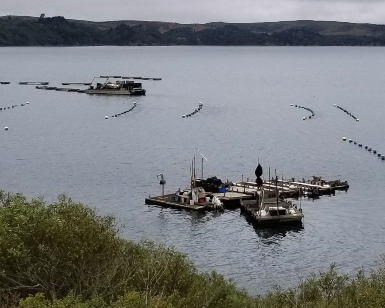San Rafael, CA – Agricultural production in Marin County shrunk by 5% in 2021 compared with the previous year, mostly because of the ongoing drought and farmers opting to fallow more of their land.
 The bright spot in the new crop report was in the aquaculture sector. Tomales Bay shellfish operations experienced increased product demands as restaurants rebounded from the height of the pandemic.
The bright spot in the new crop report was in the aquaculture sector. Tomales Bay shellfish operations experienced increased product demands as restaurants rebounded from the height of the pandemic.Assistant Agricultural Commissioner Scott Wise and Inspector Allison Klein presented the 2021 Marin County Crop & Livestock Report to the Marin County Board of Supervisors on June 14. The estimated gross total production value of local products was $96,656,000, down from $101,840,000 in 2020 and wiping out a 4% gain in value between 2019 and 2020. Only three times in history has Marin eclipsed the $100 million mark in annual gross value of agricultural products. The record is $111,061,000 in 2015.
As in past drought years, the resiliency of local farmers, ranchers, and their workforce was noted in the annual report. The lingering COVID-19 pandemic required agricultural producers to find new markets to sell their products to stay viable and handling complicated issues with human resources around their facilities.
“We are now seeing the data that shows the long-term impacts this drought is having on our agricultural industry, such as significant reductions in livestock, exorbitant feed costs, and fallowing of land,” Wise told the Board members. “In 2021, Marin’s share of this megadrought reached critical levels. Due to the lack of precipitation, ponds and wells ran dry and many farmers and ranchers resorted to hauling water to their ag operations. Still, there is only so much water an operation can afford to haul, so many growers had to fallow fields and many ranchers were forced to sell off animals.”
Marin experienced record low rainfall and a second consecutive dry winter, affecting everything from livestock to field crops to fruits and vegetables. It takes years to rebuild a livestock herd for specific traits and genetics, and crop and livestock producers are working hard to build drought resiliency into their operations.
The brightest news in the report came in the area of aquaculture, an important part of the West Marin economy. The total gross value of oysters, mussels, and clams jumped from $3.75 million to $8.2 million, an increase of 119%. The increase was attributed to revitalized demand by consumers after a year of coronavirus lockdowns and restaurant closures in 2020.
On the downside, field crops continued to slip in value because of the drought. The value of hay was down 49%, silage down 43% and harvested pasture down 33% (much of hay and silage are not sold but instead stay on local farms as feed). The total value of field crops fell from $14 million to just over $9 million. Also, fruits & vegetables were down 34% and nursery products went down 25%.
Livestock products led the way by accounting for 41% over the overall gross value of Marin agricultural products. However, the value of cattle was down 13%, slipping from just over $16 million to just under $14 million. Conventional milk production value was up 7% but the organic milk sector – traditionally a strong point for Marin farmers – was down 8%.
Over the past year, 21 Marin ranchers participated in a livestock protection cost-share program to help build and repair fences, purchase and support protection animals, and use scare devices to protect animals from predators. Protected animals include sheep, poultry, goats, cattle, water buffalo, and alpacas.
The annual report includes updates on pest prevention programs, sudden oak death, invasive weed management, and the organic certification program. All Marin County livestock and crop reports are online, including the new one. Reports are sent to the California Department of Food and Agriculture to be included in statewide reports.